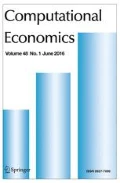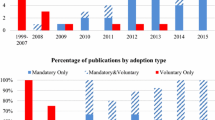Abstract
The purpose of this study is to prepare a diffusion model of the new international accounting standards known as the international financial reporting standards (IFRS). This model fits within the neo-institutional conceptual framework; more specifically, we used the DiMaggio/Powell analytical grid. Our desire to prepare this model was born from the observation that the analytical framework that is generally used to study the adoption of these new standards is the neo-institutional framework and that the principal methodologies implemented are qualitative. The question addressed in this study regards the forces leading an agent—in this case, an organisation providing standards for accounting—to adopt, at a given moment, these new standards. Existing studies, as interesting as they might be, are devoted to the question of adoption and leave aside the question of diffusion. In other words, the evolution of the system as a whole in time is ignored. Constructing a model appeared to us to be a way to move beyond these limitations. This model allows us to formalise the forces at work in the DiMaggio/Powell representation and to simulate the diffusion processes of the IFRS. To this end, we implement a multi-agent simulation. The various simulation scenarios are then compared to the observed diffusion of the IFRS.



Similar content being viewed by others
References
Albu, N., Albu, C. N., Bunea, S., Calu, D. A., & Girbina, M. M. (2011). A story about IAS/IFRS implementation in Romania. Journal of Accounting in Emerging Economies, 1(1), 76–100.
Baker, R. O. N., & Rennie, M. D. (2006). Forces leading to the adoption of accrual accounting by the Canadian Federal Government: An institutional perspective. Canadian Accounting Perspectives, 5(1), 83–112. doi:10.1506/206k-rv7l-2jmn-w3d3.
Caccia, L., & Steccolini, I. (2006). Accounting change in Italian local governments: What’s beyond managerial fashion? Critical Perspectives on Accounting, 17(2–3), 154–174. doi:10.1016/j.cpa.2003.05.004.
Carpenter, V. L., & Feroz, E. H. (2001). Institutional theory and accounting rule choice: An analysis of four US state governments’ decisions to adopt generally accepted accounting principles. Accounting, Organizations and Society, 26(7–8), 565–596. doi:10.1016/s0361-3682(00)00038-6.
Chand, P., & Patel, C. (2008). Convergence and harmonization of accounting standards in the South Pacific region. Advances in Accounting, 24(1), 83–92. doi:10.1016/j.adiac.2008.05.002.
Chiapello, E., & Medjad, K. (2009). An unprecedented privatisation of mandatory standard-setting: The case of European accounting policy. Critical Perspectives on Accounting, 20(4), 448–468. doi:10.1016/j.cpa.2008.09.002.
Chua, W. F., & Taylor, S. L. (2008). The rise and rise of IFRS: An examination of IFRS diffusion. Journal of Accounting and Public Policy, 27(6), 462–473. doi:10.1016/j.jaccpubpol.2008.09.004.
Collin, S.-O. Y., Tagesson, T., Andersson, A., Cato, J., & Hansson, K. (2009). Explaining the choice of accounting standards in municipal corporations: Positive accounting theory and institutional theory as competitive or concurrent theories. Critical Perspectives on Accounting, 20(2), 141–174. doi:10.1016/j.cpa.2008.09.003.
Davis, J. P., Eisenhardt, K. M., & Bingham, C. B. (2007). Developing theory through simulation methods. The Academy of Management Review ARCHIVE, 32(2), 480–499.
DiMaggio, P. J., & Powell, W. W. (1983). The iron cage revisited: Institutional isomorphism and collective rationality in organizational fields. American Sociological Review, 48(2), 147–160.
Eisenhardt, K. M. (1989). Building theories from case study research. Academy of Management Review, 14, 532–550.
Freese, L. (1980). Formal theorizing. Annual Review of Sociology, 6, 187–212.
Fournier, S., Ferrarini, A., & Tranvouez, E. (2010) A multiagent decision support system for scheduling repair - application to socio-technical organizations. In P. Loucopoulos & J.L Cavarero (Eds.), proceedings of the Fourth IEEE International Conference on Research Challenges in Information Science (pp. 365–374), RCIS 2010, Nice, France.
Garcia, R. (2005) Uses of agent-based modeling in innovation/new product. Development Research Journal of Product Innovation Management, 22(5), 380–398.
Hawley, A. (1968). Human ecology. In D. L. Sills (Ed.), International encyclopedia of the social sciences (pp. 328–337). New York: Macmillan.
Hoque, Z., & Adams, C. (2011). The rise and use of balanced scorecard measures in Australian government department. Financial Accountability & Management, 27(3), 308–334. doi:10.1111/j.1468-0408.2011.00527.x.
Irvine, H. (2008). The global institutionalization of financial reporting: The case of the United Arab Emirates. Accounting Forum, 32(2), 125–142. doi:10.1016/j.accfor.2007.12.003.
Järvinen, J. (2006). Institutional pressures for adopting new cost accounting systems in finnish hospitals: Two longitudinal case studies. Financial Accountability & Management, 22(1), 21–46. doi:10.1111/j.0267-4424.2006.00391.x.
Judge, W., Li, S., & Pinsker, R. (2010). National adoption of international accounting standards: An institutional perspective. Corporate Governance: An International Review, 18(3), 161–174. doi:10.1111/j.1467-8683.2010.00798.x.
Lasmin, D. (2011). An institutional perspective on international financial reporting standards adoption in developing countries. Academy of Accounting and Financial Studies Journal, 15(2), 61–71.
Mir, M. Z., & Rahaman, A. S. (2005). The adoption of international accounting standards in Bangladesh: An exploration of rationale and process. Accounting, Auditing & Accountability Journal, 18(6), 816–841.
Pfeffer, J. (1993). Barriers to the advance of organizational science: Paradigm development as a dependent variable. Academy of Management Review, 18, 599–620.
Rand, W., & Rust, R. T. (2011). Agent-based modeling in marketing: Guidelines for rigor. International Journal of Research in Marketing, 28(3), 181–193. doi:10.1016/j.ijresmar.2011.04.002.
Touron, P. (2005). The adoption of US GAAP by French firms before the creation of the International Accounting Standard Committee: An institutional explanation. Critical Perspectives on Accounting, 16(6), 851–873. doi:10.1016/j.cpa.2003.08.011.
Tsamenyi, M., Cullen, J., & González, J. M. G. (2006). Changes in accounting and financial information system in a Spanish electricity company: A new institutional theory analysis. Management Accounting Research, 17(4), 409–432. doi:10.1016/j.mar.2006.02.002.
Wang, J., Gwebu, K., Shanker, M., & Troutt, M. D. (2009). An application of agent-based simulation to knowledge sharing. Decision Support Systems, 46(2), 532–541. doi:10.1016/j.dss.2008.09.006.
Author information
Authors and Affiliations
Corresponding author
Rights and permissions
About this article
Cite this article
Dufour, D., Teller, P. & Luu, P. A Neo-institutionalist Model of the Diffusion of IFRS Accounting Standards. Comput Econ 44, 27–44 (2014). https://doi.org/10.1007/s10614-013-9384-9
Accepted:
Published:
Issue Date:
DOI: https://doi.org/10.1007/s10614-013-9384-9




